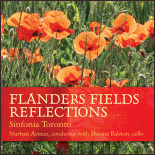Flanders Fields Reflections (2006)
| Available from the Canadian Music Centre (CMC) |
Samples
|
| Instrumentation: | String Orchestra |
| Genre: | String Orchestra Music |
Commissioner: Sinfonia Toronto, Nurhan Arman, Music Director
Premiere: Sinfonia Toronto, Nurhan Arman, conductor, The Glenn Gould Studio, March 4, 2006.
Duration: approximately 30 minutes
Movements:
- The Poppies Blow
- Still Bravely Singing
- We Are the Dead
- Loved and Were Loved
- We Shall Not Sleep
As recorded by Sinfonia Toronto, Flanders Fields Reflections, received the 2009 JUNO award for the Best Canadian Classical Composition: [Marquis Classics 81383]
 Program Note: Nurhan Arman, Music Director of the chamber orchestra, Sinfonia Toronto, commissioned Flanders Fields Reflections for the group's 2005-06 concert season and premiered in March of 2006. In 2008, Nurhan and the orchestra subsequently recorded this work on a CD devoted entirely to some of Burge's music for string orchestra. Flanders Fields Reflections was the title track of this CD and the recording of this work received the 2009 Juno award for the Best Canadian Classical Composition. That virtually all Canadian citizens and most English speakers in the Western world will immediately know that this musical work draws its inspiration from John McCrae's poem, "In Flanders Fields," is a good indication that this is perhaps the most famous poem ever written by a Canadian. Born in Guelph, Ontario, in 1872, Dr. John McCrae died in 1918 at Wimereux, France of pneumonia while on active service as a medical officer with the Royal Army Medical Corps in World War I.
Program Note: Nurhan Arman, Music Director of the chamber orchestra, Sinfonia Toronto, commissioned Flanders Fields Reflections for the group's 2005-06 concert season and premiered in March of 2006. In 2008, Nurhan and the orchestra subsequently recorded this work on a CD devoted entirely to some of Burge's music for string orchestra. Flanders Fields Reflections was the title track of this CD and the recording of this work received the 2009 Juno award for the Best Canadian Classical Composition. That virtually all Canadian citizens and most English speakers in the Western world will immediately know that this musical work draws its inspiration from John McCrae's poem, "In Flanders Fields," is a good indication that this is perhaps the most famous poem ever written by a Canadian. Born in Guelph, Ontario, in 1872, Dr. John McCrae died in 1918 at Wimereux, France of pneumonia while on active service as a medical officer with the Royal Army Medical Corps in World War I.
"In Flanders Fields," was first published in the magazine, Punch, in 1915, and later appeared posthumously in a small volume of his poetry that bears the same title. Flanders Fields Reflections is scored for string orchestra and is in five movements, each of which is titled with a phrase taken from the poem. The poem is remarkable in the way that it follows the fixed poetic form of the rondeau (which requires the repetition of the opening phrase at the end of the second and third verses) while expressing the extreme emotional gamut of loss, despair, sacrifice, obligation and hope. When one hears this poem recited at a Remembrance Day service, the words resonate with a depth that is transcendental in its power to convey what Wilfred Owen, another World War I poet, described as, "...the pity of war." It is this resonance that the composer has tried to capture.
At times, the music is literal in its approach, as with the wind effects in the first movement's, "The Poppies Blow," or the high, bird-like violin solo in the second movement's, "Still Bravely Singing." The middle movement's, "We Are The Dead," is captured in a slow funeral march while the final movement conveys the sentiment, "We Shall Not Sleep," with a melody that keeps returning and an extended series of endings. The work's most expressive music is found in the fourth movement's interpretation of "Loved and Were Loved." These few words represent so vividly, the individual tragedy that is contained within each and every death which is in stark contrast to the numerical tallies of war fatalities that can be summarized all too quickly. In this movement, a simple descending line of six notes is maintained throughout, as if to symbolically show that our search for love is perhaps humanities" most constant desire. As the poem makes clear, we cannot forget that we are alive and free today because of those who gave up their own lives or loved ones.
Full Score and Solo Organ Score (for purchase, loan or rental) and Parts (rental only) available from the Canadian Music Centre: Flanders Field Reflections-CMC
Interesting Observation: The fourth movement of this work, "Loved and Were Loved," has been performed as a stand alone movement on about as many concerts as the complete work has been performed on orchestra concerts near Remembrance Day. There have also been concerts that have performed just a few of the movements (always including "Loved and Were Loved") and in all cases, the performances seem to generate an emotional response in the audience, especially in conjunction with a recitation of the poem.
Recent Repeat Performances:
- Peterborough Symphony, Michael Newnham, conductor, Peterborough Showplace Theatre, Peterborough, ON, November 4, 2017.
- L’orchestre d’Opéra de Rouen Haute-Normandie, Jonathan Heyward, conductor, Théâtre du Casino de Dieppe, Dieppe, France, August 19, 2017.
- Symphony New Brunswick, Michael Newnham conductor, Imperial Theatre, Saint John, NB, March 15, 2017.
- Symphony New Brunswick, Michael Newnham conductor, The Playhouse, Fredericton, NB, March 14, 2017.
- Symphony New Brunswick, Michael Newnham conductor, Capitol Theatre, Moncton, NB, March 13, 2017.